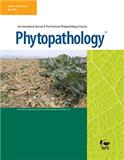安心交易
不成功退款,无后顾之忧,风险服务升级。
PHYTOPATHOLOGY
SCI/SCIE- 期刊ISSN:0031-949X
- 研究方向:农林科学
- 影响因子:3.264
- SCI类别:SCI/SCIE
- 是否OA:No
- 出版地:UNITED STATES
- 年文章数:163
- 涉及的研究方向:农林科学-植物科学
提供国内外期刊、论文、出版、专利、软著、会议等学术咨询指导服务——Allset学术网

For over 100 years Phytopathology has been considered the premier international archival journal for publication of articles on fundamental research that advances understanding of the nature of plant diseases, the agents that cause them, their spread, the losses they cause, and measures that can be used to control them.ScopePhytopathology publishes articles on fundamental research that advances understanding of the nature of plant diseases, the agents that cause them, their spread, the losses they cause, and measures that can be used to control them. Phytopathology considers manuscripts covering all aspects of plant diseases including bacteriology, host-parasite biochemistry and cell biology, biological control, disease control and pest management, description of new pathogen species description of new pathogen species, ecology and population biology, epidemiology, disease etiology, host genetics and resistance, mycology, nematology, plant stress and abiotic disorders, postharvest pathology and mycotoxins, and virology. Papers dealing mainly with taxonomy, such as descriptions of new plant pathogen taxa are acceptable if they include plant disease research results such as pathogenicity, host range, etc. Taxonomic papers that focus on classification, identification, and nomenclature below the subspecies level may also be submitted to Phytopathology. Subject matter is not a criterion for judging the merit of an article for publication in Phytopathology. However, it is the author’s duty to establish relevance to the science of plant pathology. Distinctions will be made between routine and significant. The author should clearly present the significance of the work in the article. Novelty, innovativeness, lucid writing, and hypothesis-driven research are the criteria for judging manuscripts in Phytopathology. Rapid editorial decision, speed of publication following acceptance, and a global audience are additional reasons to submit manuscripts to Phytopathology.Studies of pathogen population biology should address an original question or hypothesis. In general, studies that describe pathogen diversity or population structure are not acceptable unless they also address a biological question that advances our conceptual knowledge of pathogen population biology. In addition, as much care should be given to the development and description of an appropriate pathogen sampling scheme as is given to the subsequent procurement and analysis of marker data. However, sampling deficiencies beyond the control of the author will be acceptable in some cases, e.g., when conducting analyses of historical isolate collections or quarantined pathogens.Genomics and functional genomics-related papers are encouraged; however, authors must demonstrate how the research addresses the central emphases of Phytopathology described above. Papers that solely report complete or partial nucleotide se?quences including draft genome sequences of organisms are not acceptable for publication unless they relate structure to function or demonstrate how the sequence information may advance our understanding of the biology of the pathogen. Methods-type marker papers should meet one of the following criteria: (i) a report of new techniques or modifications that significantly enhances current techniques or the application of these methods, or (ii) the use of techniques to investigate interesting biological questions that contribute to the basic concepts and understanding of plant pathology.
100多年来,《植物病理学》一直被认为是出版有关基础研究文章的首要国际档案期刊,这些文章增进了对植物疾病的性质、致病因素、传播、造成的损失以及可用于控制这些疾病的措施的了解。范围植物病理学发表关于基础研究的文章,这些文章促进了对植物疾病的性质、致病因素、传播、造成的损失以及可用于控制这些疾病的措施的理解。植物病理学认为手稿涵盖所有方面的植物病害包括细菌学,开始生物化学和细胞生物学、生物控制、疾病控制和害虫管理、新病原体的描述物种的描述新病原体物种,生态和人口生物学、流行病学、疾病病因、宿主遗传和阻力,真菌学,线虫学,植物压力和非生物障碍,采后病理和真菌毒素和病毒学。以分类学为主要内容的论文,如对新的植物病原菌类群的描述,如包含植物病害的致病性、寄主范围等研究成果,均可接受。分类学论文的重点是分类,鉴定和命名低于亚种水平也可以提交植物病理学。主题不是判断植物病理学上发表的文章优劣的标准。然而,建立与植物病理学的相关性是作者的责任。将区分日常工作和重要工作。作者应该在文章中清楚地说明这项工作的意义。新颖性、创新性、清晰的写作和假设驱动的研究是判断植物病理学手稿的标准。快速的编辑决策、接受后的出版速度以及全球读者是向植物病理学提交手稿的额外原因。病原体种群生物学的研究应该解决一个原始的问题或假设。一般来说,描述病原体多样性或种群结构的研究是不可接受的,除非它们还涉及一个生物学问题,从而提高了我们对病原体种群生物学的概念知识。此外,在制定和描述适当的病原体取样方案时,应像在随后采购和分析标记数据时一样,给予足够的重视。然而,在某些情况下,如对历史上分离的标本或被隔离的病原体进行分析时,作者无法控制的抽样缺陷是可以接受的。鼓励发表基因组学和功能基因组学相关论文;然而,作者必须证明该研究如何处理上述植物病理学的中心重点。只报告完整或部分核苷酸序列(包括生物体基因组序列草案)的论文是不能发表的,除非它们将结构与功能联系起来,或者证明序列信息如何促进我们对病原体生物学的理解。Methods-type标记文件应满足下列标准之一:(i)的新技术或者修改的报告显著增强当前的技术或这些方法的应用,或(ii)使用技术研究有趣的生物学问题,有助于植物病理学的基本概念和理解。
| 大类学科 | 分区 | 小类学科 | 分区 | Top期刊 | 综述期刊 |
| 农林科学 | 2区 | PLANT SCIENCES 植物科学 | 2区 | 是 | 否 |
| JCR分区等级 | JCR所属学科 | 分区 | 影响因子 |
| Q1 | PLANT SCIENCES | Q1 | 4.01 |


安心交易
不成功退款,无后顾之忧,风险服务升级。
合规备案认证机构
资质许可齐全,合规经营,用户权益有保障。
正刊保障
刊物在国家新闻出版署网可查,抵制假刊、增刊。
对公账户资金监管
交易均通过对公账户,资金安全有保障。
国内期刊
中文文章服务首选
国际期刊
英文文章服务首选
国际会议
会议文章服务首选
评职加分
评职称文章服务首选812751拥有老客户
918539评职称指导
63352国际出版服务
819867开具合同